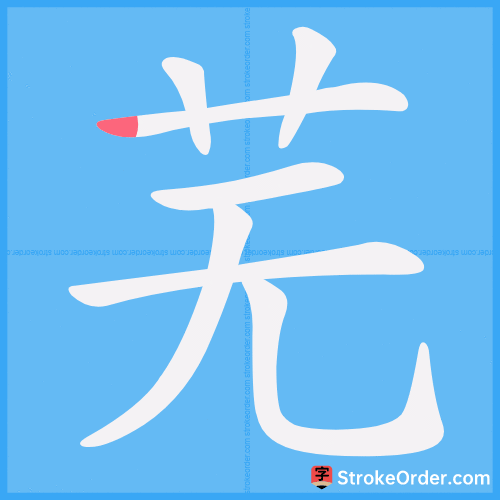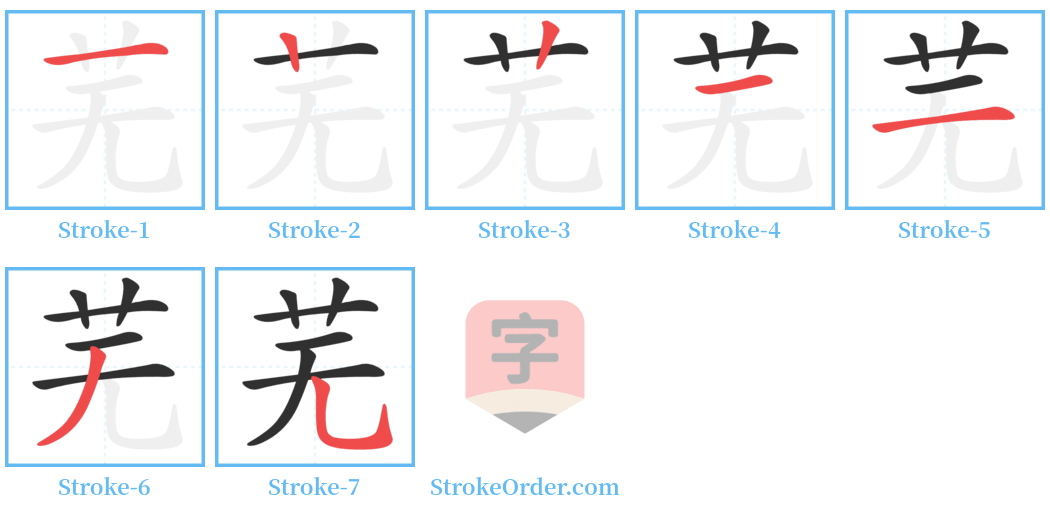芜 Stroke Order
Animated Stroke Order of 芜

Stroke Order Diagrams for 芜

Step-by-Step Handwriting Guide for 芜

Learn to Write Chinese Characters with Video Tutorials
Watch the video of writing the Chinese character "芜", learn the correct stroke order (笔顺) of the character "芜", and master the standard way of writing the character "芜".
Free Printable Handwriting Practice with Stroke Order: 芜
Printable Writing Practice Worksheet of "芜" in Portrait Orientation (Tian Zi Ge)

Printable Writing Practice Worksheet of "芜" in Landscape Orientation (Tian Zi Ge)

Information of 芜
Pinyin
wú
Radical
艹
Strokes
7 strokes
Usage
★★★★★
Definition
overgrown with weeds
芜 (wú)
1. 草长得杂乱。
Grass grows chaotically.
2. 乱草丛生的地方。
A place overgrown with weeds.
3. 喻杂乱(多指文辞)。
Metaphor for disorder (often referring to writing).
4. 草长得杂乱:荒~。~城(田地荒芜长满乱草的旧城)。
Grass grows chaotically: overgrown wasteland. Wasteland city (an old city with fields overgrown with wild grass).
5. 乱草丛生的地方:平~。
A place overgrown with wild grass: flat wasteland.
6. 喻杂乱(多指文辞):~杂(杂乱,没有条理)。~词。~劣(杂乱拙劣)。
Metaphor for disorder (often in writing): chaotic (disordered, lacking coherence), messy writing, poor and disordered expressions.
本义:土地不耕种而荒废
Original meaning: Land left uncultivated and abandoned.
造字法:形声。从艸,无声。
Character formation: Phono-semantic compound. Consists of the component for grass (艸) without sound.
同本义: ([En.] be overgrown with weeds)
Same original meaning: (be overgrown with weeds)
引例:
1. 《老子》:田甚芜,仓甚虚。
"The fields are very overgrown, and the granaries are very empty." - Laozi
2. 杨恽《报孙会宗书》:田彼南山,芜秽不治。
"The fields there by the southern mountain are overgrown and neglected." - Yang Yun
3. 晋·陶渊明《归去来兮辞》:田园将芜。
"The fields and gardens are about to become overgrown." - Tao Yuanming
例:
又如:芜荒(荒芜);芜绝(荒芜断绝);芜蔓(荒芜;荒凉);芜废(荒废);芜荟(荒芜);芜蒌(野草);芜旷(犹荒芜)
For example: overgrown wasteland; wasteland depletion; desolate wilderness; abandoned fields; overgrown wild herbs; wild grasses; still desolate.
杂乱: ([En.] (of writings) mixed and disorderly)
Disorder: (of writings) mixed and disorderly
引例:
1. 《世说新语·文学》:陆文深而芜。
"Lu Wen is deep yet disordered." - A New Account of Tales of the World
例:
又如:芜音(声音多而杂乱。引申指音律不协畅);芜昧(不明,杂乱不清的样子);芜浅(杂乱浅陋);芜累(文字不够简炼,常有多余重复之处);芜漫(杂乱散漫)
For example: chaotic sounds (many sounds mixed and disorderly, extends to refer to discordant music); vague confusion (unclear, disordered appearance); shallow disorder (mixed shallow); verbose (not concise, often containing redundant repetitions); scattered/disorderly.
名义:
1. 丛生的杂草 ([En.] thicket grass)
Name: Thicket grass.
引例:
1. 颜延年《秋朝诗》:寝兴日已寒,白露生庭芜。
"As the sleeping interest grows cold with the day, white dew brings life to the grass in the courtyard." - Yan Yanniannian
例:
又如:芜没(指杂草丛生,隐没于其中);芜芜(草木茂密繁盛的样子)
For example: overgrown and hidden; lush greenery (the state of dense growth of grass and trees).
2. 姓
Surname.
miscellaneous / mixed and disorderly (of writing) / disordered and confusing / mixed-up and illogical
Input Method for 芜
Pinyin
wu2
Wubi
afqb
Cangjie
tmku
Zhengma
eagr
Four Corner
44412
Unicode
U+829c
Same Pronunciation Characters